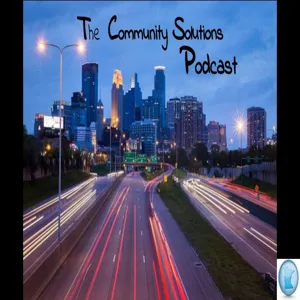Podcast Summary
The Federal Home Loan Bank's Role in Affordable Housing and Bank Liquidity: The Federal Home Loan Bank supports affordable housing projects and offers liquidity to banks during financial instability, but its role is under scrutiny as major US banks have collapsed while borrowing from it.
The Federal Home Loan Bank, a 90-year-old financial institution, plays a crucial role in funding affordable housing projects and providing liquidity to banks during periods of financial instability. Darienne Woods and Waelin Wong of NPR's The Indicator from Planet Money reported on a groundbreaking ceremony for an affordable housing development in Mesquite, Nevada, where they met Nia Guhmer, an affordable housing advocate in the Nevada Housing Division. Guhmer highlighted the challenges of securing funding for such projects. The Federal Home Loan Bank has stepped in to help, allocating funds specifically for Nevada's affordable housing initiatives. However, the bank also extends loans to banks facing liquidity issues. Four major US banks, including First Republic, have collapsed this year and had borrowed from the Federal Home Loan Bank before their demise. As regional banks face jitters, an economic policy expert discussed the importance and potential for an overhaul of this financial architecture. Meanwhile, Babson College sponsors The Indicator, offering an intensive 9-month master's program in entrepreneurial leadership to equip recent graduates with practical skills for today's business landscape. American Express also sponsors the show.
American Express Business Gold Card earns 4x points on top 2 categories, Federal Home Loan Bank System lends to struggling banks: American Express Business Gold Card offers 4x points on top categories, Federal Home Loan Bank System lends to banks as a safety net
American Express Business Gold Card offers businesses the flexibility to earn four times points on their top two eligible spending categories every month, providing powerful backing for businesses. Meanwhile, the Federal Home Loan Bank System, established during the Great Depression, plays a crucial role in the financial sector by lending out over $800 billion to struggling banks, acting as a safety net since 1932. This system, unique in its cooperative structure and federal backing, raises funds through bond sales and lends money to members at lower rates, requiring collateral as security.
Federal Home Loan Banks: Jumping the Queue During Bank Failures: During financial crises, federal home loan banks can lend to institutions with questionable collateral, like those holding subprime mortgages, due to their ability to be paid back before other creditors.
The federal home loan banks, due to a legal mechanism called a super lien, have the ability to jump the queue and be paid back before other creditors during a bank failure. This feature makes them an attractive lender for banks with questionable collateral, such as those holding crummy subprime mortgages. During the 2008 financial crisis, this dynamic led to a surge in lending from federal home loan banks to institutions deep in subprime mortgages, like Washington Mutual and Countrywide Financial. Despite being a potential lifeline for the financial system, federal home loan banks are sometimes seen as a last stop before going to the Federal Reserve due to the stigma attached to the latter's lending programs.
Role of Federal Home Loan Banks in Crisis: Critics argue Federal Home Loan Banks may exacerbate crises by lending large sums to financially troubled institutions, while proponents view them as essential providers of liquidity for community banks and credit unions. Borrowing by failed banks totaled billions during recent failures.
The role of Federal Home Loan Banks in the financial system, particularly during times of crisis, is a subject of ongoing debate. While some, like Ryan Donovan, view them as essential providers of liquidity for community banks and credit unions, others, such as Aaron Klein, argue that they may exacerbate crises by lending large sums to financially troubled institutions. This was highlighted during the recent failures of Silicon Valley Bank, Signature, First Republic, and Silvergate, which collectively borrowed billions of dollars from the Federal Home Loan Bank system. Critics, like Klein, liken this situation to a Looney Tunes cartoon where the banks are the coyote running off a cliff, only to be tapped on the shoulder when disaster strikes. With the government agency that regulates these banks conducting a comprehensive review, the future of the Federal Home Loan Bank model is uncertain. However, it is important to note that these banks also contribute 10% of their earnings to affordable housing programs in their regions.
Federal Home Loan Bank System Surprisingly Benefits Local Communities: The Federal Home Loan Bank System, an old financial institution, unexpectedly offers significant benefits for local communities through funding projects like affordable housing and supporting initiatives such as food pantries and job training programs.
The Federal Home Loan Bank System, an old financial institution, unexpectedly offers significant benefits for local communities by funding projects like affordable housing and supporting initiatives such as food pantries and job training programs. This system, which funnels money through community banks, can do a great deal of good if refocused and reused. For instance, in Nevada, the state's affordable housing advocate, Nia Gerber, has helped secure grants from the regional federal home loan bank for first-time homebuyers and affordable housing projects. The groundbreaking ceremony for one such project included a commemorative stone where attendees wrote their thoughts. Nia wrote "housing is a human right." This episode was produced by Britney Cronin, fact-checked by Sarah Juarez, and edited by Keikkinenen. Support for NPR comes from Saatva and Fundrise. Saatva offers luxury mattresses at affordable prices, while Fundrise expands its real estate portfolio with high-interest rates, making real estate assets more accessible. Remember, carefully consider the investment objectives, risks, charges, and expenses before investing.





